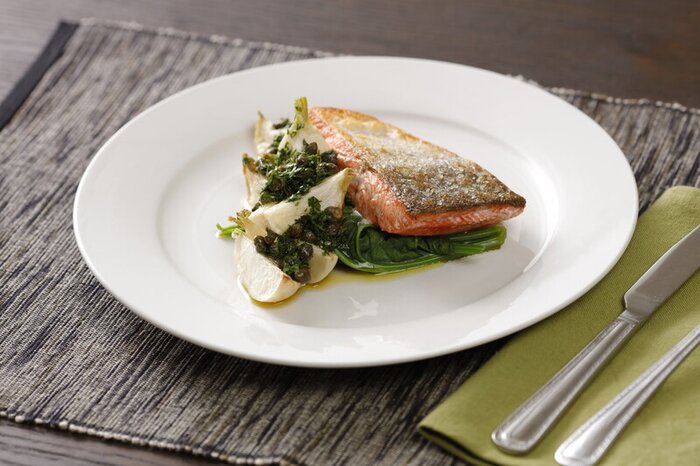You’ve learned the hard way how that after-dinner “snack” can keep you up at night (we’re looking at you Ben & Jerry!). Here are seven feel-good foods that can help you get some quality shut-eye.
1) Oats
The complex carbs in oats act like a shuttle to get more of the sleep-inducing amino acid tryptophan into your brain where your body uses it to make sleep hormones melatonin and serotonin. Try a bowl when you need a late-night dinner—but skip the sweet instant stuff and opt for plain rolled oats for the most benefits.
2) Tart Cherry Juice
Tart cherries are a natural source of melatonin, the sleep hormone that regulates your sleep-wake cycles. But that’s not their only plus: The antioxidants in cherries fight inflammation, which can wreak havoc on the most restorative stages of your sleep. Dilute the tart, unsweetened juice with sparkling water for a hydrating nightcap, sans hangover.
3) Kiwi
Like cherries, the antioxidants in kiwis fight inflammatory free radicals that can sabotage sleep. They are also a good source of folate, which helps soothe restless legs, and are one of the only fruits with a high concentration of sleep-promoting serotonin.
Treat yourself to a kiwi or two an hour before bed to help you fall asleep faster and stay asleep longer. Cut kiwis in half and scoop out the fruit with a spoon or eat them sliced with the skin on – no peeling required.

4) Salmon
Salmon is one of only a few natural sources of omega-3s and vitamin D. Both nutrients play a role in regulating your sleep-wake cycle and help combat inflammation for more restful slumber and better daytime functioning. Aim for at least two to three servings of fish, especially fatty fish like salmon, every week. Not a fan of seafood? You may be able to reap similar sleep benefits from a supplement.
5) Pumpkin Seeds
Small but mighty pumpkin seeds are rich in essential minerals like iron and zinc—which help prevent pesky overnight wakeups—and muscle-soothing magnesium. Snack on the seeds straight-up or use them as a crunchy topper for salads and soups.
6) Soy
The isoflavones found in soy are compounds that work like estrogen to help you sleep better and longer. These benefits aren’t just for postmenopausal women either. Research suggests that soy’s sleep benefits extend to the general population too. Up your soy intake by snacking on edamame or try tempeh or tofu in place of meat for your next stir-fry.
7) Chamomile tea
This traditional sleep remedy gets its sedative-like effects from a type of flavonoid called apigenin. Apigenin binds to the GABA receptors in your brain to make you feel calm and sleepy. Make a soothing cup of chamomile tea a part of your bedtime routine for less tossing-and-turning.
References:
Spring B. Recent research on the behavioral effects of tryptophan and carbohydrate. Nutr Health. 1984;3(1-2):55-67. doi: 10.1177/026010608400300204. PMID: 6400041.
Lin HH, Tsai PS, Fang SC, Liu JF. Effect of kiwifruit consumption on sleep quality in adults with sleep problems. Asia Pac J Clin Nutr. 2011;20(2):169-74. PMID: 21669584
St-Onge MP, Mikic A, Pietrolungo CE. Effects of Diet on Sleep Quality. Adv Nutr. 2016;7(5):938-949. Published 2016 Sep 15. doi:10.3945/an.116.012336
Hansen AL, Dahl L, Olson G, et al. Fish consumption, sleep, daily functioning, and heart rate variability. J Clin Sleep Med. 2014;10(5):567-575. doi:10.5664/jcsm.3714
Cui Y, Niu K, Huang C, et al. Relationship between daily isoflavone intake and sleep in Japanese adults: a cross-sectional study. Nutr J. 2015;14:127. Published 2015 Dec 29. doi:10.1186/s12937-015-0117-x
Srivastava JK, Shankar E, Gupta S. Chamomile: A herbal medicine of the past with bright future. Mol Med Rep. 2010;3(6):895-901. doi:10.3892/mmr.2010.377


